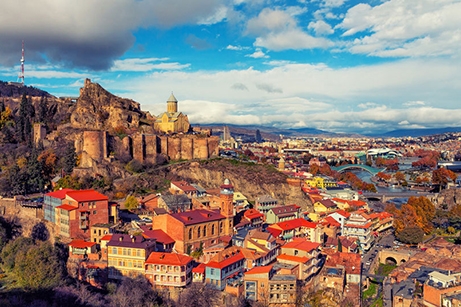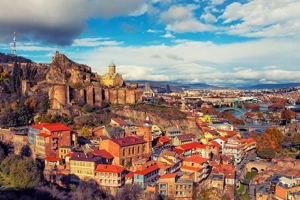Georgia On My Mind – the Country that Astonished Me
I am so pleasantly confused. Is this Tbilisi, my childhood home? As I walk the cobble-stoned streets of the historic old-town my ears are filled with the sounds of club music, Russian tourists, and the laughter of young teens out on a Saturday night. The smell of fruity ‘shisha’ layers the brightly lit alleyways. A crowd of kids and their parents squeeze into a tiny corner ice-cream shop for an after-dinner treat. A cute boutique offers different types of ‘Churchkhela.’ This is a modern city; I think to myself.
Looking up towards the mountains, I’m proud to see the blurred glimmer of ‘city lights’ from afar. If I squint it looks like millions of orange fireflies fluttering together in the distance. I feel at ease as I turn towards the river, and I see, yes, another modern change: the addition of an enormous glass bridge, strangely curved, and way too white. However, it is hoisted neither on freshly paved riverbanks nor by newly developed concrete walls. I’m glad to see that the greenish, murky Mtkvari cradled against those cliffs, extremely authentic--about to collapse at any moment--has not changed. The rocky walls scream antiquity and by observing them it’s as if I am looking into history.
As I mosey my way down the stairs of a skinny avenue, my focus changes...the hollow sound of rich harmony draws me closer. The tune is hauntingly sweet and I find myself standing in the middle of a 6th-century church.
Every word echoes around me, the sound of worship bouncing off the stone walls and floating up towards the frescoed ceiling. I see a blur of wax candles, held by strong hands. Heads covered by silk scarves bow as knees are bent. Dark eyes close, and defined lips kiss the gold icons and then mumble and move along with the words of honest prayer.
Despite a tidied exterior, not much has changed. The soul of my Georgia is on fire, and as alive as ever.
My mom cried the day we moved here sixteen years ago. Our plane landed on a runway without lights or modern asphalt. The terminal was one dark room, filled with people in black. They stared at our blonde heads and touched our hair for good luck.
We drove up to a house on a gravel road covered with pot-holes. Dead leaves hung over metal poles, a few remainders of last seasons’ grapes clung to the dry vines. ‘Houses,’ built on the slant of a hilly street, stared at us with sad expressions, as if asking for help. They looked strangely rich, but lost...as if they had been part of a most important kingdom...but then were somehow forgotten. It felt like everything was broken.
We were caught in a lost nation only nine years since their independence from the Soviet Union, and less than five years since a brutal civil war severed the country. And yet...somehow identity was still very much there. A place with so much life; all it took was to knock on a neighbor’s door and they would invite you inside to meet their whole family, offer you every crumb in the house, and make you drink more than your weight in wine.
I could write a 200-page novel about Georgian hospitality.
I know my simple words would not give it justice but I wish they could. My pages would be full of stories of never-ending dinners; of plates stacked on top of each other and the art of ‘toasting.’
My book would talk of the power in their national dancing and how if you stayed at the dinner long enough, someone was sure to get up to dance...or sing...or play the piano...or play any kind of instrument.
My sister and I would be driven twice a week to the Tbilisi Opera House for private ballet lessons. The theater was taken over during times of war, used as shelter, and had been burned to the ground--twice. When it reopened shortly before we moved here, tickets had to be priced so cheap there was no money to pay staff. The entrance to the theater was never lit. Of course we would always go in the back-way, and walk up seven flights of stairs, since the elevator didn’t work when the electricity shut off. The halls smelled of sawdust, urine, and watermelon floor cleaner, used to scrub around the holes in the broken linoleum. The walls were always sticky, with large chunks of chipping yellow paint and graffiti marking who had been there before us.
We had a live pianist with a grand piano, and splintering floors, and we always danced in the dark.
My teacher regularly snuck us into the VIP box seats in the almost fully empty theater after we finished class late in the evening. The golden ceilings, bright scarlet velvet seats, and sparkling chandelier (that did not have the means to be turned on) would make us forget in a second the grimy classroom we just came from. The electricity would go off in the middle of Swan Lake, Sleeping Beauty, Giselle, but the orchestra never stopped playing; the dancers never stopped moving. Art was not fixated on light.
As I end my evening walk in my modern Tbilisi, I reach Rustaveli Street, just a few steps from my hotel. I notice strange things like street lamps, paved roads, and I come across a beautifully blue-lit fountain--water flowing, and bronze ballet dancers gracefully posed in the middle. I look up, and there it is: my Opera House, freshly painted, with renovated cupolas and beautiful golden brown stripes. A crowd breaks through the doors for a cigarette break during intermission. They are all smiling. The dancers are probably performing on a fully lit stage.
The theater must be full tonight.
Nothing around me is crumbling.
Alexa Shearer is a 22-year-old American daughter of diplomats. She lived in Georgia as a child from 2000-2002. Tbilisi quickly became ‘home’ to her and her family, and now they try to visit once a year.
Alexa Shearer
Photo: AP/FOTOLIA.
Click here to view the full version of the story.












